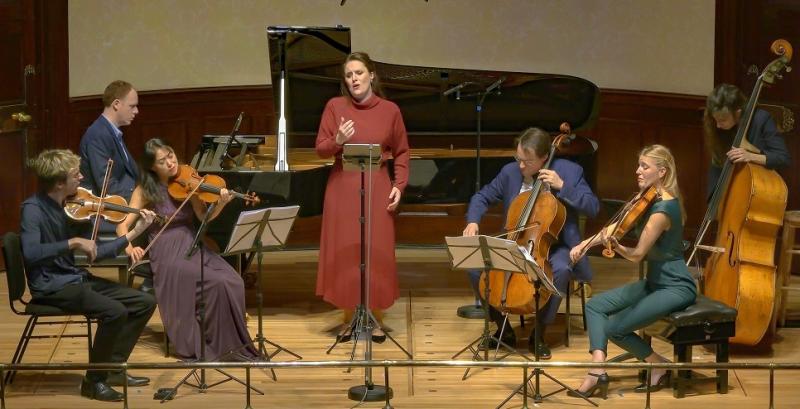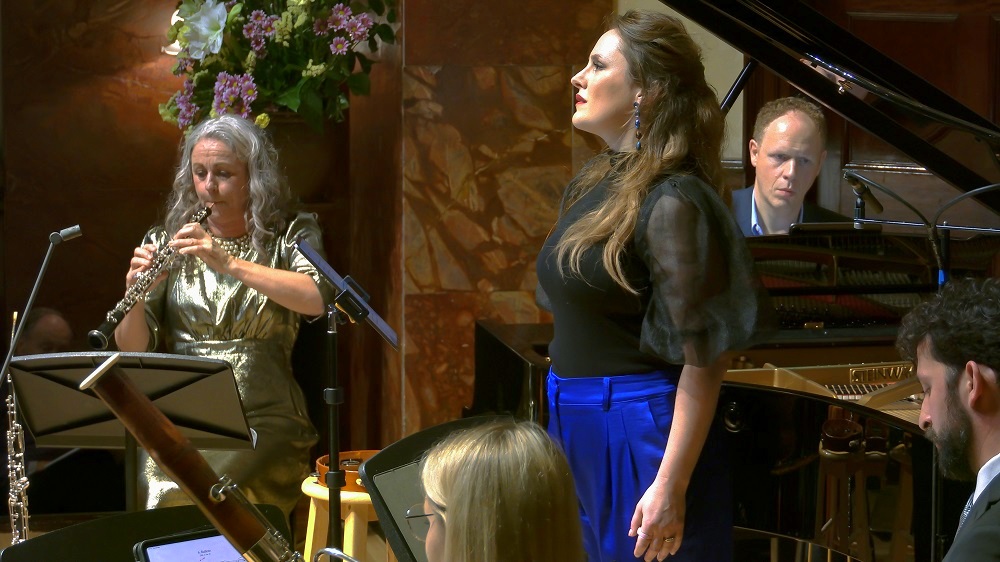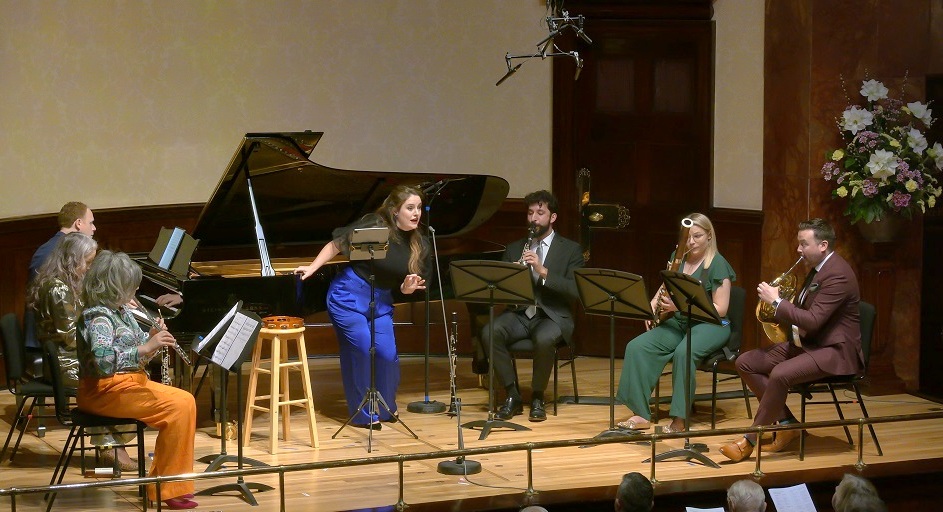Louise Alder & Friends, Wigmore Hall review - magic carpet rides with soprano, strings and woodwind | reviews, news & interviews
Louise Alder & Friends, Wigmore Hall review - magic carpet rides with soprano, strings and woodwind
Louise Alder & Friends, Wigmore Hall review - magic carpet rides with soprano, strings and woodwind
Levitational joy in an all-French programme, with modified rapture over two arrangements

Sometimes all the stars align in musical performance. There’s no soprano more alive to the expression of musical joy and rapture than Louise Alder, no composer more levitational in his strange later adventures than Fauré, no instrumentalists strings better than pianist Joseph Middleton, the Doric String Quartet and double-bass player Laurène Durantel at being supernatural companions throughout his song-cycle La bonne chanson.
Fauré's other miracles among his chamber works turn up with comparative regularity in concert, but for some reason I've not experienced his nine-song tribute to Paul Verlaine live before. So from first vioinist Tim Crawford's magical first sigh through to the final setting of "cette fantaisie et cette raison" it was a case of rising above the ground and never quite touching it, even if the composer's endless modulations and strange excursions sometimes came to rest. Spellbound to the point of unconsciously abandoning my critical faculties when it came to details, I can only note the perfection especially with which each song was rounded off ("La lune blanche" especially with its famous conclusion "C'est l'heure exquise").  Effervescent in presentation as always, Alder told us that what felt like ages of pregnancy had addled her brain and made her programme a very short first half. We weren't complaining, but there was sheer delight, too, in what she'd added, Berlioz's "La Captive" for soprano, cello (John Myerscough of the Dorics) and piano. There could have been five more verses, so captivating were the refrains especially, where Alder showed no weakness in the lower register of a totally connected voice.
Effervescent in presentation as always, Alder told us that what felt like ages of pregnancy had addled her brain and made her programme a very short first half. We weren't complaining, but there was sheer delight, too, in what she'd added, Berlioz's "La Captive" for soprano, cello (John Myerscough of the Dorics) and piano. There could have been five more verses, so captivating were the refrains especially, where Alder showed no weakness in the lower register of a totally connected voice.
The second half had a flaw not apparent in prospect. George Strivens had arranged both Ravel's Shéhérazade and a selection of Canteloube's Songs of the Auvergne for wind quintet alongside piano (pictured below, Amina Hussain, Rachael Clegg, Middleton, Alder, Max Welford, Guylaine Eckersley and Mark Alder Bennett). It may be the Wigmore's far from perfect acoustics amplified the woodwinds' middle registers, but they offered too much competition for the full-voiced soprano, who nevertheless provided the full frisson on the climax of "Asie" for the word "haine" (hate).  I can't help feeling Ravel's oriental rhapsodies would have worked better with the crucial flute/piccolo and oboe/cor anglais alongside two or three strings to set cushions on this particular flying carpet. Flautist Amina Hussain, wearing orange shalvar trousers to complement Alder's blue silk, was a true partner in "La flûte enchantée", and later Rahcel Clegg on cor anglais and clarinettist Max Welfordcame to the fore as rustic voices in the Canteloube. There were plenty of opportunities for the wind to shine here, and Middleton managed to make the tinkling ivories of "Baïlèro" truly dreamy. Another instrument joined the fray for the several more earthy numbers - the tambourine, of which Alder proved to be an accomplished as well as an exuberant exponent.
I can't help feeling Ravel's oriental rhapsodies would have worked better with the crucial flute/piccolo and oboe/cor anglais alongside two or three strings to set cushions on this particular flying carpet. Flautist Amina Hussain, wearing orange shalvar trousers to complement Alder's blue silk, was a true partner in "La flûte enchantée", and later Rahcel Clegg on cor anglais and clarinettist Max Welfordcame to the fore as rustic voices in the Canteloube. There were plenty of opportunities for the wind to shine here, and Middleton managed to make the tinkling ivories of "Baïlèro" truly dreamy. Another instrument joined the fray for the several more earthy numbers - the tambourine, of which Alder proved to be an accomplished as well as an exuberant exponent.
rating
Share this article
The future of Arts Journalism
You can stop theartsdesk.com closing!
We urgently need financing to survive. Our fundraising drive has thus far raised £49,000 but we need to reach £100,000 or we will be forced to close. Please contribute here: https://gofund.me/c3f6033d
And if you can forward this information to anyone who might assist, we’d be grateful.

Subscribe to theartsdesk.com
Thank you for continuing to read our work on theartsdesk.com. For unlimited access to every article in its entirety, including our archive of more than 15,000 pieces, we're asking for £5 per month or £40 per year. We feel it's a very good deal, and hope you do too.
To take a subscription now simply click here.
And if you're looking for that extra gift for a friend or family member, why not treat them to a theartsdesk.com gift subscription?
more Classical music
 BBC Proms: Ehnes, Sinfonia of London, Wilson review - aspects of love
Sensuous Ravel, and bittersweet Bernstein, on an amorous evening
BBC Proms: Ehnes, Sinfonia of London, Wilson review - aspects of love
Sensuous Ravel, and bittersweet Bernstein, on an amorous evening
 Presteigne Festival 2025 review - new music is centre stage in the Welsh Marches
Music by 30 living composers, with Eleanor Alberga topping the bill
Presteigne Festival 2025 review - new music is centre stage in the Welsh Marches
Music by 30 living composers, with Eleanor Alberga topping the bill
 Lammermuir Festival 2025 review - music with soul from the heart of East Lothian
Baroque splendour, and chamber-ensemble drama, amid history-haunted lands
Lammermuir Festival 2025 review - music with soul from the heart of East Lothian
Baroque splendour, and chamber-ensemble drama, amid history-haunted lands
 BBC Proms: Steinbacher, RPO, Petrenko / Sternath, BBCSO, Oramo review - double-bill mixed bag
Young pianist shines in Grieg but Bliss’s portentous cantata disappoints
BBC Proms: Steinbacher, RPO, Petrenko / Sternath, BBCSO, Oramo review - double-bill mixed bag
Young pianist shines in Grieg but Bliss’s portentous cantata disappoints
 theartsdesk at the Lahti Sibelius Festival - early epics by the Finnish master in context
Finnish heroes meet their Austro-German counterparts in breathtaking interpretations
theartsdesk at the Lahti Sibelius Festival - early epics by the Finnish master in context
Finnish heroes meet their Austro-German counterparts in breathtaking interpretations
 Classical CDs: Sleigh rides, pancakes and cigars
Two big boxes, plus new music for brass and a pair of clarinet concertos
Classical CDs: Sleigh rides, pancakes and cigars
Two big boxes, plus new music for brass and a pair of clarinet concertos
 Waley-Cohen, Manchester Camerata, Pether, Whitworth Art Gallery, Manchester review - premiere of no ordinary violin concerto
Images of maternal care inspired by Hepworth and played in a gallery setting
Waley-Cohen, Manchester Camerata, Pether, Whitworth Art Gallery, Manchester review - premiere of no ordinary violin concerto
Images of maternal care inspired by Hepworth and played in a gallery setting
 BBC Proms: Barruk, Norwegian Chamber Orchestra, Kuusisto review - vague incantations, precise laments
First-half mix of Sámi songs and string things falters, but Shostakovich scours the soul
BBC Proms: Barruk, Norwegian Chamber Orchestra, Kuusisto review - vague incantations, precise laments
First-half mix of Sámi songs and string things falters, but Shostakovich scours the soul
 BBC Proms: Alexander’s Feast, Irish Baroque Orchestra, Whelan review - rapturous Handel fills the space
Pure joy, with a touch of introspection, from a great ensemble and three superb soloists
BBC Proms: Alexander’s Feast, Irish Baroque Orchestra, Whelan review - rapturous Handel fills the space
Pure joy, with a touch of introspection, from a great ensemble and three superb soloists
 BBC Proms: Moore, LSO, Bancroft review - the freshness of morning wind and brass
English concert band music...and an outlier
BBC Proms: Moore, LSO, Bancroft review - the freshness of morning wind and brass
English concert band music...and an outlier
 Willis-Sørensen, Ukrainian Freedom Orchestra, Wilson, Cadogan Hall review - romantic resilience
Passion, and polish, from Kyiv's musical warriors
Willis-Sørensen, Ukrainian Freedom Orchestra, Wilson, Cadogan Hall review - romantic resilience
Passion, and polish, from Kyiv's musical warriors
 BBC Proms: Faust, Gewandhausorchester Leipzig, Nelsons review - grace, then grandeur
A great fiddler lightens a dense orchestral palette
BBC Proms: Faust, Gewandhausorchester Leipzig, Nelsons review - grace, then grandeur
A great fiddler lightens a dense orchestral palette

Add comment